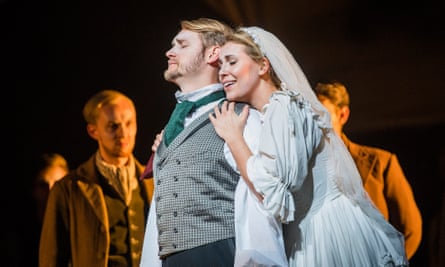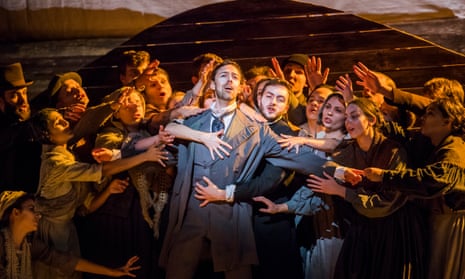Judith Weir’s second opera has hardly been seen in the UK since Scottish Opera commissioned it and gave the first performances in 1990. British Youth Opera’s resourceful and very thoroughly rehearsed production of The Vanishing Bridegroom, directed by Stuart Barker and conducted by James Holmes, is the first full staging here since that premiere.
Its revival provides a reminder of how ingenious Weir’s musical storytelling can be, and how her music can suddenly alight on moments of shining transcendence, even if narrative and characterisation are never fused completely convincingly. Sometimes, it seems as if the mechanics of presenting the narrative matter more to Weir than packaging it in a way that involves and rewards her audience.

The Vanishing Bridegroom telescopes three Scottish folk tales, two from the Outer Hebrides, one from Sutherland, into a compact family saga, in which the protagonists themselves provide the links between the stories. The husband whose bride is returned to him in the first tale becomes the bridegroom who is spirited away by fairies in the second; his daughter is then the central character of the third, in which she resists the advances of a rich man who turns out to be the devil, and asserts her independence as a woman.
It’s all ingeniously dovetailed and packed into a single, 80-minute span, with a score in which references to Scottish folk music, psalm singing and work songs ghost through the textures. But despite the compactness there are moments when the dramatic pulse falters, and it’s hard to remain engaged with characters who inhabit a world poised between realism and fairytale enchantment. Barker’s production, in Andrew Riley’s semi-naturalistic designs, keeps the action as lucid as it can be, but hearing more of the words might make the narrative easier to grasp, though Weir’s solo vocal lines and the density of her choral writing don’t always aid clarity.
The student cast, all on the stage throughout the opera, work hard, and the best of the soloists make the most of the opportunities the multiple roles in the score prescribe. Standout contributions come from soprano Alexandra Lowe as the bride in the first story, the bass Timothy Edlin in all three parts, and the mezzo Ida Ränzlöv, who takes the role of the daughter in the final story with immaculate diction and tremendous dramatic presence.

Comments (…)
Sign in or create your Guardian account to join the discussion